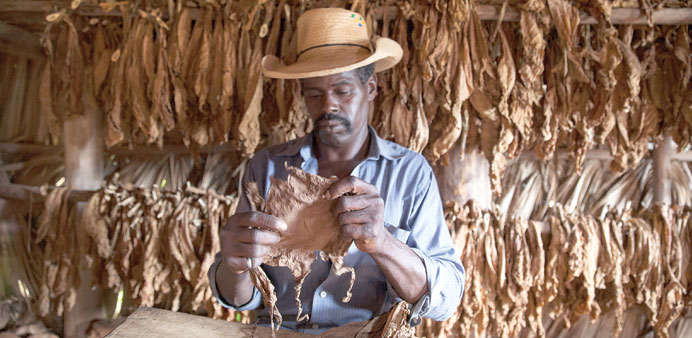ART OF ROLLING: Yovanni Gavilan prepares to hand roll a cigar at a Pinar del Rio tobacco farm.
By Alice Short
Cuba has more than 3,000 species of plants unique to the island, but it’s unlikely that horticulture will come to mind while exploring the streets of Old Havana.
When my daughter, Madeline, and I left that neighbourhood, we encountered a little more green — magnificent banyan trees near the University of Havana and the lush landscaping that surrounds some of the embassies in the Miramar neighbourhood.
One day we drove to Vinales, two hours west of Havana, where we finally were surrounded by sights often associated with the Caribbean. The landscape started to look verdant and at times out of control. Flowering plants popped up everywhere: Bougainvillea spilled in front of tiny homes, and red-blossomed vines snaked around palm trees.
Our first stop was the Soroa Orchid Garden, which is maintained by the University of Pinar del Rio, part of a larger park and botanical garden and home to hundreds of varieties — cymbidium orchids, tiger lily orchids and cattleya white orchids among them — about 30 of which are housed in a small building at the entrance. I could have spent an entire day in that structure, but we had a schedule to keep and a tobacco farm to visit.
About 20 minutes later, we stopped at a private tobacco farm where young men, stooped over in the fields, were harvesting, by hand, the second crop of the season. Tobacco is one of the mainstays of the country’s economy and a major moneymaking crop, thanks to worldwide fascination with Cuban cigars. Manufacturers produce tens of millions of cigars each year, and a few of them ended up in our suitcases.
We dutifully inspected the leaves of a mature plant and the drying barns where the first crop, brown and wrinkled, awaited the rolling process. The farm seemed relatively prosperous, with its well-maintained buildings and nonagenarian owner observing visitors from a rocking chair, but its homespun charms couldn’t compete with the exotica of the orchids.
The next day, we stopped at Finca la Yoandra, an organic garden about 25 minutes west of Old Havana and an example of Cuba’s urban agriculture movement, which according to a 2014 report in the Guardian newspaper supplies about “70 percent of the fruits and vegetables consumed in cities such as Havana and Santa Clara.”
The 2-acre garden is attached to an Italian restaurant called Il Divino, a popular stop for tour buses and groups. The well-tended garden, including a lime tree and row after row of vegetables, was a peaceful respite from our nonstop learning.—Los Angeles Times/TNS

